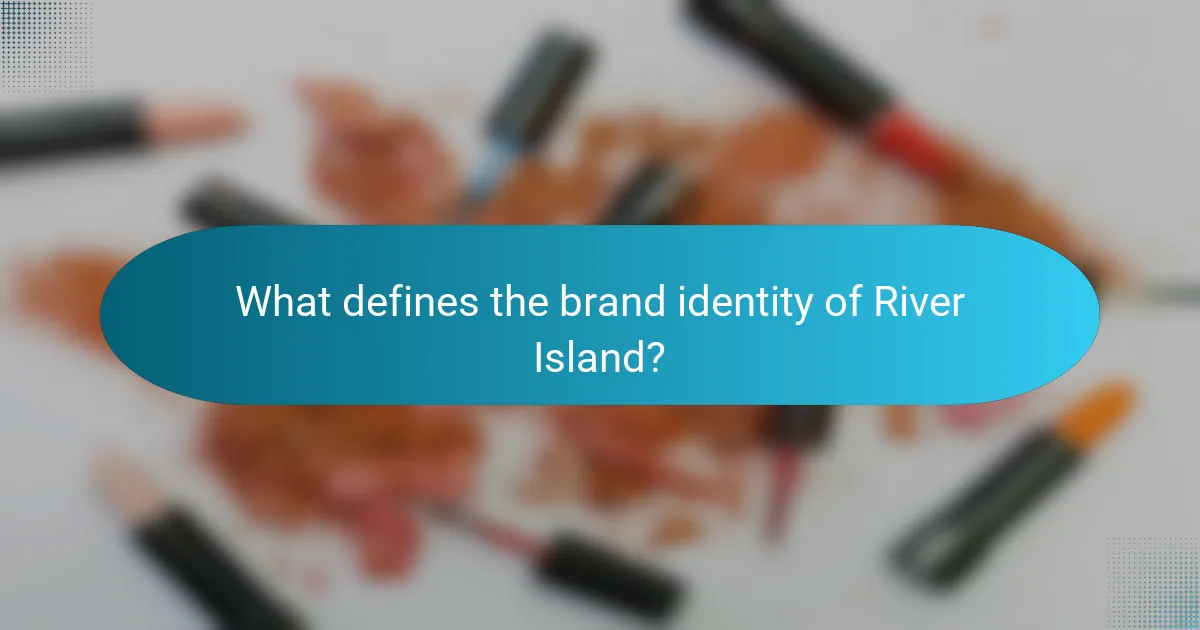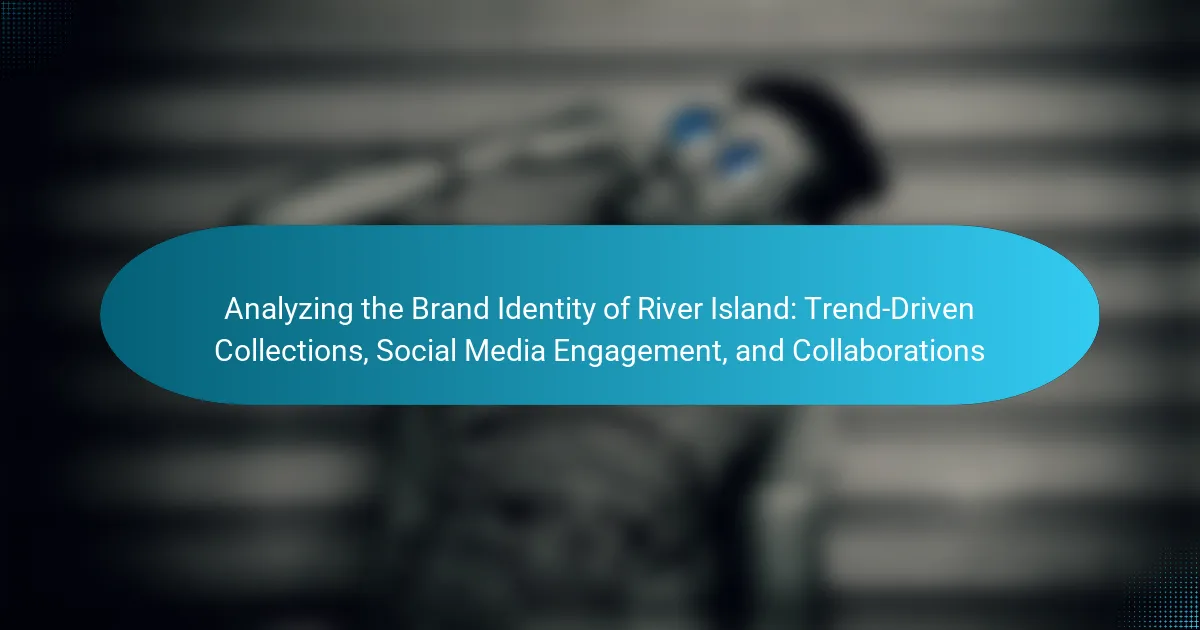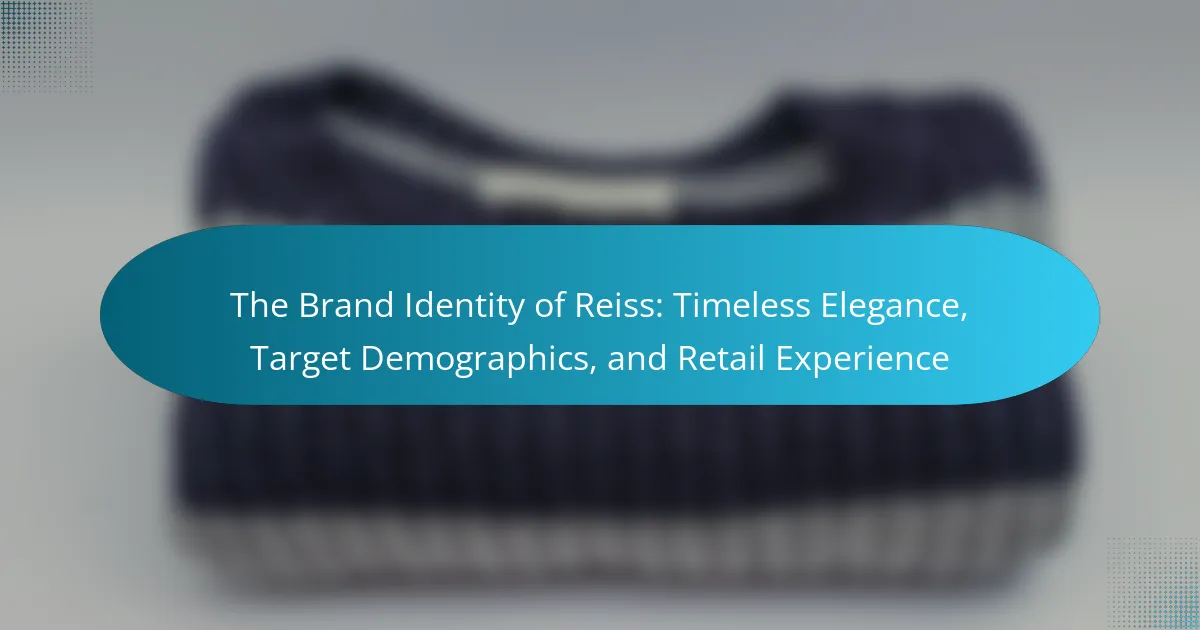
What defines the brand identity of River Island?
River Island’s brand identity is defined by its trend-driven fashion collections and youthful appeal. The brand emphasizes contemporary styles that resonate with a diverse audience. River Island is known for its vibrant designs and affordable pricing. It consistently updates its offerings to reflect current fashion trends. Social media engagement plays a crucial role in its marketing strategy. The brand actively connects with customers through platforms like Instagram and TikTok. Collaborations with influencers and designers further enhance its visibility. River Island’s identity is rooted in being accessible yet stylish for the modern consumer.
How does River Island differentiate itself in the fashion market?
River Island differentiates itself in the fashion market through its trend-driven collections and strong social media presence. The brand continually adapts to fashion trends, offering fresh styles that appeal to a young audience. River Island engages with customers via platforms like Instagram and TikTok, fostering a community around its brand. Collaborations with influencers and designers further enhance its unique offerings. The brand’s commitment to affordability without compromising style sets it apart from competitors. Additionally, River Island’s distinctive in-store experience complements its online presence, creating a cohesive shopping journey. This strategic approach allows River Island to maintain relevance in a competitive market.
What are the key attributes of River Island’s brand identity?
River Island’s brand identity is characterized by its trend-driven collections, vibrant designs, and strong social media presence. The brand focuses on delivering contemporary fashion that appeals to a youthful audience. River Island is known for its unique and bold styles that often reflect current fashion trends. The brand engages actively with customers through social media platforms, fostering a community around its products. Collaborations with influencers and designers further enhance its visibility and appeal. River Island emphasizes affordability without compromising on style, making fashion accessible to a broader audience. Its commitment to sustainability is also emerging as a key attribute in recent years.
How do River Island’s values influence its brand perception?
River Island’s values significantly shape its brand perception by emphasizing inclusivity, fashion-forwardness, and sustainability. These values resonate with a diverse consumer base, fostering a sense of belonging among customers. Inclusivity in fashion allows River Island to cater to various body types and styles, enhancing its appeal. The commitment to being fashion-forward positions the brand as a trendsetter, attracting style-conscious shoppers. Sustainability initiatives, such as eco-friendly collections, enhance brand loyalty among environmentally aware consumers. This alignment with contemporary values strengthens River Island’s reputation in a competitive retail landscape. Such strategic focus on values ultimately drives customer engagement and brand affinity.
What role do trend-driven collections play in River Island’s identity?
Trend-driven collections are central to River Island’s brand identity. They reflect the brand’s commitment to staying relevant and fashionable. These collections enable River Island to cater to current consumer preferences. By frequently updating their offerings, the brand maintains a fresh and contemporary image. Trend-driven pieces attract a diverse customer base seeking the latest styles. This approach enhances brand loyalty as customers return for new, trendy items. Additionally, these collections support River Island’s positioning as a fashion leader in the retail market. The brand’s ability to quickly adapt to trends showcases its agility and responsiveness in the fashion industry.
How does River Island identify and respond to fashion trends?
River Island identifies and responds to fashion trends through market research and social media analysis. The brand monitors fashion shows, industry reports, and influencer activities. This helps them stay updated on emerging styles and consumer preferences. River Island also engages with customers via social media platforms. They analyze feedback and interactions to gauge trends. The brand uses this data to inform their design process. Collaborations with designers further enhance their trend responsiveness. This strategy allows River Island to create relevant and appealing collections.
What are some examples of successful trend-driven collections by River Island?
River Island has launched several successful trend-driven collections. One notable example is the “Festival Collection,” which features vibrant patterns and bohemian styles. This collection aligns with the festival fashion trend, appealing to young consumers during summer events. Another successful collection is the “Athleisure Range,” which combines comfort and style, reflecting the growing trend of casual yet fashionable clothing. Additionally, the “Sustainable Collection” showcases eco-friendly materials, tapping into the increasing consumer demand for sustainable fashion. Each of these collections has resonated with River Island’s target audience, contributing to the brand’s popularity and sales growth.
How does River Island engage with its audience on social media?
River Island engages with its audience on social media through interactive content and customer feedback. The brand frequently uses polls and quizzes to encourage participation. It shares user-generated content, showcasing customers wearing its products. River Island also utilizes influencer collaborations to reach wider audiences. The brand posts regularly on platforms like Instagram and Twitter to maintain visibility. Engaging with comments and messages fosters a community feel. Seasonal campaigns and promotions are highlighted through eye-catching visuals. These strategies help to build brand loyalty and drive sales.
What platforms does River Island utilize for social media engagement?
River Island utilizes Instagram, Facebook, Twitter, and TikTok for social media engagement. These platforms allow River Island to connect with a diverse audience. Instagram is used for visual storytelling and showcasing collections. Facebook serves as a platform for community interaction and promotions. Twitter is leveraged for real-time updates and customer service. TikTok is utilized for engaging content that resonates with younger audiences.
How does River Island’s social media strategy enhance its brand identity?
River Island’s social media strategy enhances its brand identity by fostering engagement and showcasing its trend-driven collections. The brand utilizes platforms like Instagram and TikTok to connect with a younger audience. It shares visually appealing content that reflects current fashion trends. User-generated content is prominently featured, creating a sense of community. Collaborations with influencers amplify brand visibility and authenticity. River Island’s consistent messaging reinforces its identity as a fashion-forward retailer. This approach has resulted in increased brand loyalty and recognition among consumers.

What are the implications of collaborations for River Island’s brand identity?
Collaborations significantly enhance River Island’s brand identity by broadening its market reach. They allow the brand to tap into new customer segments and diversify its product offerings. Collaborations with well-known designers or influencers elevate brand prestige and visibility. This strategic alignment with popular figures can attract younger consumers who value trendy, exclusive items. Collaborations also foster innovation in design, keeping the brand relevant in a competitive retail landscape. Furthermore, they create buzz on social media, driving engagement and brand loyalty. River Island’s partnerships have included successful collections that resonate with current fashion trends, reinforcing its image as a trendsetter.
How do collaborations impact River Island’s market presence?
Collaborations enhance River Island’s market presence by expanding its audience reach. Partnering with influencers and designers attracts diverse customer segments. These collaborations generate buzz and increase brand visibility in competitive markets. For example, the collaboration with fashion influencer Kourtney Kardashian boosted social media engagement significantly. This led to a rise in online sales and store traffic. Collaborations also allow River Island to innovate its product offerings. Unique, co-branded items often create a sense of exclusivity. This exclusivity can drive consumer demand and brand loyalty. Overall, collaborations strategically strengthen River Island’s position in the fashion industry.
What types of collaborations has River Island pursued?
River Island has pursued several types of collaborations. These include partnerships with high-profile designers and celebrities. Notable collaborations feature designers like Ashley Williams and brands such as Disney. River Island also engages in seasonal collaborations, particularly for holiday collections. The brand has launched exclusive collections that align with current fashion trends. Collaborations often focus on delivering unique designs to attract diverse customer segments. These partnerships enhance River Island’s brand visibility and appeal in the competitive fashion market.
How do these collaborations align with River Island’s brand values?
Collaborations align with River Island’s brand values by emphasizing inclusivity and trend-driven fashion. These partnerships often feature diverse designers and influencers. This approach reflects River Island’s commitment to representing various styles and cultures. Collaborations also enhance the brand’s innovative image. They introduce fresh perspectives and unique collections that appeal to a broader audience. By engaging with contemporary trends, River Island maintains relevance in a competitive market. This strategy aligns with their core value of providing accessible fashion that resonates with customers.
What are the benefits of River Island’s collaborations for customers?
River Island’s collaborations offer customers exclusive access to unique collections. These partnerships often feature limited-edition items that stand out in the market. Collaborations can enhance the brand’s appeal by introducing fresh designs and perspectives. Customers benefit from the creativity brought by different designers or influencers. This variety meets diverse style preferences among consumers. Additionally, collaborations often generate buzz on social media, increasing visibility for the brand. Engaging with popular figures can attract new customers and retain existing ones. Overall, these collaborations foster a dynamic shopping experience that resonates with fashion-forward individuals.
How do collaborations enhance product offerings for River Island’s audience?
Collaborations enhance product offerings for River Island’s audience by introducing unique designs and limited-edition collections. These partnerships often involve renowned designers or celebrities, attracting diverse customer segments. Collaborations create excitement and urgency, encouraging consumers to engage with the brand. They also allow River Island to tap into the partner’s fan base, expanding its market reach. Collaborations often reflect current trends, ensuring that the product offerings remain relevant. The exclusivity of collaborative items can drive higher sales and brand loyalty. Additionally, these partnerships can enhance River Island’s brand image by associating it with high-profile names. Overall, collaborations enrich the shopping experience for River Island’s audience by providing fresh, trendy, and exclusive options.
What unique experiences do collaborations create for consumers?
Collaborations create unique experiences for consumers by merging distinct brand identities. This fusion often results in exclusive products that cannot be found elsewhere. Consumers benefit from innovative designs that combine the strengths of both brands. Collaborations may also offer limited-time collections, enhancing the sense of urgency and excitement. They foster community engagement through shared values and interests. Collaborative marketing campaigns can create immersive experiences, such as pop-up events or interactive social media content. These experiences enhance consumer loyalty and brand affinity. Research indicates that 70% of consumers feel more connected to brands that collaborate with others.

What insights can be drawn from analyzing River Island’s brand identity?
River Island’s brand identity reflects a strong focus on trend-driven fashion. The brand targets a youthful demographic, emphasizing contemporary styles. Their collections are frequently updated to align with current fashion trends. River Island also engages actively on social media platforms. This engagement fosters a community around the brand. Collaborations with influencers enhance brand visibility and appeal. The brand’s identity is characterized by vibrant marketing campaigns. These campaigns often highlight inclusivity and diversity in fashion.
How can other brands learn from River Island’s approach?
Other brands can learn from River Island’s approach by adopting trend-driven collections. River Island consistently analyzes market trends to create relevant products. This keeps their offerings fresh and appealing to consumers. Additionally, River Island excels in social media engagement. They interact with their audience through relatable content and promotions. This builds a strong community and brand loyalty. Collaborations with influencers and designers also enhance their visibility. These partnerships attract diverse customer segments and boost sales. By implementing similar strategies, other brands can improve their market presence and customer connection.
What best practices can be adopted from River Island’s trend-driven strategy?
River Island’s trend-driven strategy emphasizes staying current with fashion trends. This involves regular market analysis to identify emerging styles. The brand frequently updates its collections to reflect seasonal trends. Engaging with consumers through social media is also crucial. River Island uses platforms like Instagram to showcase new arrivals and interact with customers. Collaborations with influencers further amplify their reach. Utilizing customer feedback helps refine product offerings. Lastly, maintaining a strong brand identity ensures consistency across all channels. These practices contribute to River Island’s successful trend-driven approach.
How can effective social media engagement be modeled after River Island?
Effective social media engagement can be modeled after River Island by leveraging trend-focused content and interactive campaigns. River Island frequently showcases its latest collections through visually appealing posts. This attracts attention and encourages user interaction. The brand utilizes user-generated content to foster community engagement. By reposting customer photos, River Island builds authenticity and loyalty. Seasonal campaigns and collaborations with influencers enhance reach and relevance. Data shows that brands with active influencer partnerships experience higher engagement rates. River Island’s consistent brand voice across platforms strengthens its identity. This approach results in a loyal following and increased brand visibility.
What practical tips can enhance brand identity for fashion brands?
Fashion brands can enhance their brand identity by establishing a clear and consistent visual identity. This includes using a specific color palette and typography that reflects the brand’s personality. Engaging storytelling is essential; brands should communicate their values and mission effectively.
Utilizing social media platforms for authentic engagement helps build a community around the brand. Collaborations with influencers or other brands can expand reach and create unique offerings. Consistent customer experience across all touchpoints reinforces brand identity.
Regularly updating collections to reflect current trends keeps the brand relevant. Research shows that brands with strong identities can increase customer loyalty by up to 80%. These strategies collectively strengthen brand recognition and customer connection.
How can brands effectively leverage social media to build their identity?
Brands can effectively leverage social media to build their identity by engaging with their audience consistently. They should create content that reflects their core values and mission. This includes sharing behind-the-scenes insights, product launches, and customer stories. Active interaction through comments and messages fosters community and loyalty. Utilizing visual storytelling enhances brand recognition and appeal. Data shows that 70% of consumers feel more connected to brands with a strong social media presence. Collaborations with influencers can further amplify brand visibility and credibility. Regularly analyzing engagement metrics helps refine strategies for better audience connection.
What strategies can be employed to create successful collaborations?
Successful collaborations can be created by establishing clear communication and shared goals. Clear communication fosters understanding among partners. It ensures all parties are aligned on objectives. Shared goals create a unified vision for the collaboration. This alignment enhances teamwork and productivity. Regular check-ins can help maintain focus and address issues promptly. Trust among collaborators is essential for open dialogue. Building trust can lead to more innovative solutions. Diverse perspectives can also enhance creativity and effectiveness in collaborations.
The main entity of the article is River Island, a fashion brand known for its trend-driven collections and strong social media engagement. The article analyzes how River Island’s brand identity is shaped by its contemporary styles, affordability, and commitment to inclusivity and sustainability. Key topics include the brand’s differentiation strategies, the role of collaborations with influencers and designers, and the impact of social media on customer engagement. Additionally, it highlights successful collections and offers insights into best practices for enhancing brand identity in the fashion industry.


